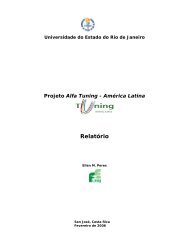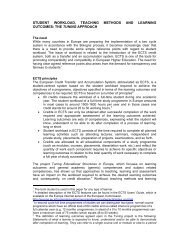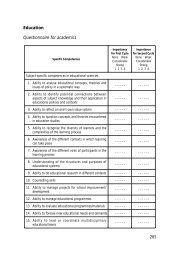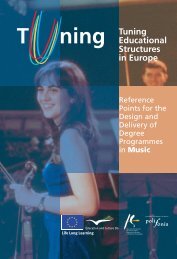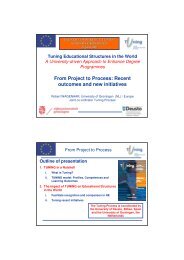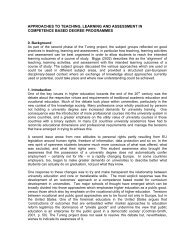- Page 1:
-Overview ofthe Bologna ProcessImpl
- Page 5 and 6:
Coordination of the EIE-SURVEYOR Th
- Page 7 and 8:
Table of Contents0PRESENTATION ....
- Page 10 and 11:
14. LT: Lietuva (Lithuania) .......
- Page 12 and 13:
125.4. Doctoral Studies in the Unit
- Page 14 and 15:
EIE-SurveyorBologna process in Euro
- Page 16 and 17:
EIE-SurveyorBologna process in Euro
- Page 18 and 19:
EIE-SurveyorBologna process in Euro
- Page 20 and 21:
EIE-SurveyorBologna process in Euro
- Page 22 and 23:
EIE-SurveyorBologna process in Euro
- Page 24 and 25:
EIE-SurveyorBologna process in Euro
- Page 26 and 27:
EIE-SurveyorBologna process in Euro
- Page 28 and 29:
EIE-SurveyorBologna process in Euro
- Page 30 and 31:
EIE-SurveyorBologna process in Euro
- Page 32 and 33:
EIE-SurveyorBologna process in Euro
- Page 34 and 35:
EIE-SurveyorBologna process in Euro
- Page 36 and 37:
EIE-SurveyorBologna process in Euro
- Page 38 and 39:
EIE-SurveyorBologna process in Euro
- Page 40 and 41:
EIE-SurveyorBologna process in Euro
- Page 42 and 43:
EIE-SurveyorBologna process in Euro
- Page 44 and 45:
EIE-SurveyorBologna process in Euro
- Page 46 and 47:
EIE-SurveyorBologna process in Euro
- Page 48 and 49:
EIE-SurveyorBologna process in Euro
- Page 50 and 51:
EIE-SurveyorBologna process in Euro
- Page 52 and 53:
EIE-SurveyorBologna process in Euro
- Page 54 and 55:
EIE-SurveyorBologna process in Euro
- Page 56 and 57:
EIE-SurveyorBologna process in Euro
- Page 58 and 59:
EIE-SurveyorBologna process in Euro
- Page 60 and 61:
EIE-SurveyorBologna process in Euro
- Page 62 and 63:
EIE-SurveyorBologna process in Euro
- Page 64 and 65:
EIE-SurveyorBologna process in Euro
- Page 66 and 67:
EIE-SurveyorBologna process in Euro
- Page 68 and 69:
EIE-SurveyorBologna process in Euro
- Page 70 and 71:
EIE-SurveyorBologna process in Euro
- Page 72 and 73:
EIE-SurveyorBologna process in Euro
- Page 74 and 75:
EIE-SurveyorBologna process in Euro
- Page 76 and 77:
EIE-SurveyorBologna process in Euro
- Page 78 and 79:
EIE-SurveyorDoctoralStudies2.5 Doct
- Page 80 and 81:
EIE-Surveyor2.5.3. Thesis WorkSubmi
- Page 82 and 83:
EIE-Surveyor3.1- SUPERVISION OF DOC
- Page 84 and 85:
EIE-Surveyor4 - AWARDING OF DOCTORA
- Page 86 and 87:
EIE-Surveyor- 74 -
- Page 88 and 89:
EIE-SurveyorThere are 6 higher educ
- Page 90 and 91:
EIE-Surveyor3.2. Figures on the wei
- Page 92 and 93:
EIE-Surveyor3.5. Doctoral Studies i
- Page 94 and 95:
EIE-Surveyor3.5.3 Thesis WorkSubmis
- Page 96 and 97:
EIE-Surveyor3.1- SUPERVISION OF DOC
- Page 98 and 99:
EIE-Surveyor3.3- PRESENTATION OF WO
- Page 100 and 101:
EIE-Surveyor- 88 -
- Page 102 and 103:
EIE-Surveyor4.1.1 UElectrical and I
- Page 104 and 105:
EIE-SurveyorStudents in Germany in
- Page 106 and 107:
EIE-Surveyor4.3. Degrees in EIE in
- Page 108 and 109:
EIE-SurveyorTechnical data processi
- Page 110 and 111:
EIE-Surveyor4.5.2. DevelopmentCours
- Page 112 and 113:
EIE-Surveyor4.6. Questionnaires3 -
- Page 114 and 115:
EIE-Surveyor3.2- COURSE WORK3.2.1 D
- Page 116 and 117:
EIE-Surveyor4 - AWARDING OF DOCTORA
- Page 118 and 119:
EIE-Surveyor- 106 -
- Page 120 and 121:
EIE-Surveyor• The Estonian higher
- Page 122 and 123:
EIE-SurveyorAcademic higher educati
- Page 124 and 125:
EIE-Surveyor5.2. Figures on the wei
- Page 126 and 127:
EIE-Surveyor5.3. Degrees in EIE in
- Page 128 and 129:
EIE-Surveyor5.3.3 UMaster levelMast
- Page 130 and 131:
EIE-SurveyorDoctoralStudies5.5 Doct
- Page 132 and 133:
EIE-Surveyor5.5.3. Thesis WorkSubmi
- Page 134 and 135:
EIE-Surveyor3.1- SUPERVISION OF DOC
- Page 136 and 137:
EIE-Surveyor4 - AWARDING OF DOCTORA
- Page 138 and 139:
EIE-Surveyor- 126 -
- Page 140 and 141:
EIE-Surveyor6.1.1 UElectrical and I
- Page 142 and 143:
EIE-Surveyor6.2. Figures on the wei
- Page 144 and 145:
EIE-SurveyorEIE. Master level (cour
- Page 146 and 147:
EIE-SurveyorB5. Diplomado en Radioe
- Page 148 and 149:
EIE-Surveyor6.5.2. DevelopmentCours
- Page 150 and 151:
EIE-Surveyor6.6. Questionnaires3 -
- Page 152 and 153:
EIE-Surveyor3.2- COURSE WORK3.2.2.2
- Page 154 and 155:
EIE-Surveyor4.2- THESIS EXAMINATION
- Page 156 and 157:
EIE-SurveyorIn upper secondary voca
- Page 158 and 159:
EIE-SurveyorDetails of the contents
- Page 160 and 161:
EIE-Surveyor7.4 ReferencesThe infor
- Page 162 and 163:
EIE-Surveyor7.5.2. DevelopmentCours
- Page 164 and 165:
EIE-Surveyor7.6. Questionnaires3 -
- Page 166 and 167:
EIE-Surveyor3.1 - SUPERVISION OF DO
- Page 168 and 169:
EIE-Surveyor4 - AWARDING OF DOCTORA
- Page 170 and 171:
EIE-Surveyor4.2- THESIS EXAMINATION
- Page 172 and 173:
EIE-Surveyor1Institutional point of
- Page 174 and 175:
EIE-Surveyor• Doctorate level (se
- Page 176 and 177:
EIE-Surveyor8.2. Figures on the wei
- Page 178 and 179:
EIE-Surveyorinstrumentales*Géniem
- Page 180 and 181:
EIE-SurveyorFormer Diplôme d'Etude
- Page 182 and 183:
EIE-Surveyor8.4. ReferencesThe info
- Page 184 and 185:
EIE-SurveyorThree to four years. Th
- Page 186 and 187:
EIE-Surveyor8.6. Questionnaires3 -
- Page 188 and 189:
EIE-Surveyor3.2- COURSE WORK3.2.2.2
- Page 190 and 191: EIE-Surveyor4.2- THESIS EXAMINATION
- Page 192 and 193: EIE-Surveyor- 180 -
- Page 194 and 195: EIE-Surveyorsubjects. The degree qu
- Page 196 and 197: EIE-SurveyorEngineeringDept of Comp
- Page 198 and 199: EIE-Surveyor9.3. Degrees in EIE in
- Page 200 and 201: EIE-SurveyorMaster in Automatic Con
- Page 202 and 203: EIE-SurveyorPatraIoanninaHeraklionH
- Page 204 and 205: EIE-SurveyorPatraSerresCreteTechnol
- Page 206 and 207: EIE-SurveyorHeraklionHeraklionAthen
- Page 208 and 209: EIE-SurveyorDoctoralStudies9.5. Doc
- Page 210 and 211: EIE-Surveyor9.5.3 Thesis WorkSubmis
- Page 212 and 213: EIE-Surveyor3.1- SUPERVISION OF DOC
- Page 214 and 215: EIE-Surveyor4 - AWARDING OF DOCTORA
- Page 216 and 217: EIE-Surveyor- 204 -
- Page 218 and 219: EIE-SurveyorThe educational system
- Page 220 and 221: EIE-SurveyorStandards of higher edu
- Page 222 and 223: EIE-SurveyorFigure 10.4: Weight of
- Page 224 and 225: EIE-SurveyorDegrees offered in prog
- Page 226 and 227: EIE-SurveyorDoctoralStudies10.5. Do
- Page 228 and 229: EIE-Surveyor10.5.3. Thesis WorkSubm
- Page 230 and 231: EIE-Surveyor3.1- SUPERVISION OF DOC
- Page 232 and 233: EIE-Surveyor3.2- COURSE WORK3.2.3.3
- Page 234 and 235: EIE-Surveyor4.2- THESIS EXAMINATION
- Page 236 and 237: EIE-Surveyor- 224 -
- Page 238 and 239: EIE-Surveyor11.1.1 UElectrical and
- Page 242 and 243: EIE-Surveyor11.3.2 UHonours Bachelo
- Page 244 and 245: EIE-SurveyorComputer and Communicat
- Page 246 and 247: EIE-Surveyor11.5.2. DevelopmentCour
- Page 248 and 249: EIE-Surveyor11.6. Questionnaires3 -
- Page 250 and 251: EIE-Surveyor3.2- COURSE WORK3.2.1 D
- Page 252 and 253: EIE-Surveyor4.2- THESIS EXAMINATION
- Page 254 and 255: EIE-Surveyor- 242 -
- Page 256 and 257: EIE-SurveyorAdmission requirements
- Page 258 and 259: EIE-Surveyor12.1.3 UImplementation
- Page 260 and 261: EIE-Surveyor12.5.2. DevelopmentCour
- Page 262 and 263: EIE-Surveyor12.6. Questionnaires3 -
- Page 264 and 265: EIE-Surveyor3.1- SUPERVISION OF DOC
- Page 266 and 267: EIE-Surveyor4 - AWARDING OF DOCTORA
- Page 268 and 269: EIE-Surveyor- 256 -
- Page 270 and 271: EIE-Surveyor• Computer science an
- Page 272 and 273: EIE-Surveyor13.3.1 UBachelor levelB
- Page 274 and 275: EIE-SurveyorDoctoralStudies13.5. Do
- Page 276 and 277: EIE-Surveyor13.5.3. ThesisSubmissio
- Page 278 and 279: EIE-Surveyor3.1- SUPERVISION OF DOC
- Page 280 and 281: EIE-Surveyor4 - AWARDING OF DOCTORA
- Page 282 and 283: EIE-Surveyor- 270 -
- Page 284 and 285: EIE-SurveyorThe Doctor of Science (
- Page 286 and 287: EIE-SurveyorElectronics Engineering
- Page 288 and 289: EIE-Surveyor• Uhttp://www.aikos.s
- Page 290 and 291:
EIE-Surveyor14.5.2. DevelopmentCour
- Page 292 and 293:
EIE-Surveyor14.6. Questionnaires3 -
- Page 294 and 295:
EIE-Surveyor3.2- COURSE WORK3.2.2.2
- Page 296 and 297:
EIE-Surveyor4.2- THESIS EXAMINATION
- Page 298 and 299:
EIE-Surveyor15.2. LanguagesThe Univ
- Page 300 and 301:
EIE-SurveyorDoctoralStudies15.5. Do
- Page 302 and 303:
EIE-Surveyor15.6. Questionnaire3 -
- Page 304 and 305:
EIE-Surveyor3.2- COURSE WORK3.2.2.2
- Page 306 and 307:
EIE-Surveyor4.2- THESIS EXAMINATION
- Page 308 and 309:
EIE-Surveyor- 296 -
- Page 310 and 311:
EIE-SurveyorPostgraduateeducation(D
- Page 312 and 313:
EIE-SurveyorUniversity ofLatviaFacu
- Page 314 and 315:
EIE-SurveyorVentspilsUniversity Col
- Page 316 and 317:
EIE-Surveyor16.4. List of degreesUB
- Page 318 and 319:
EIE-SurveyorManagement InstitutePro
- Page 320 and 321:
EIE-Surveyor16.5. ReferencesThe inf
- Page 322 and 323:
EIE-Surveyor16.5.2. DevelopmentCour
- Page 324 and 325:
EIE-Surveyor16.6. Questionnaires3 -
- Page 326 and 327:
EIE-Surveyor3.2- COURSE WORK3.2.2.2
- Page 328 and 329:
EIE-Surveyor4.2- THESIS EXAMINATION
- Page 330 and 331:
EIE-Surveyor- 318 -
- Page 332 and 333:
EIE-SurveyorM.Phil degree which is
- Page 334 and 335:
EIE-SurveyorDoctoralStudies17.3. Do
- Page 336 and 337:
EIE-Surveyor17.3.3. Thesis WorkSubm
- Page 338 and 339:
EIE-Surveyor3.1- SUPERVISION OF DOC
- Page 340 and 341:
EIE-Surveyor4 - AWARDING OF DOCTORA
- Page 342 and 343:
EIE-Surveyor- 330 -
- Page 344 and 345:
EIE-Surveyorin the process of givin
- Page 346 and 347:
EIE-SurveyorImplementation of the B
- Page 348 and 349:
EIE-Surveyor1. UEntrance from upper
- Page 350 and 351:
EIE-SurveyorNorwegian University of
- Page 352 and 353:
EIE-Surveyor• Nominal and real du
- Page 354 and 355:
EIE-Surveyor18.5.2. DevelopmentCour
- Page 356 and 357:
EIE-Surveyor18.5.5. Questionnaires3
- Page 358 and 359:
EIE-Surveyor3.2- COURSE WORK3.2.2.2
- Page 360 and 361:
EIE-Surveyor4.2- THESIS EXAMINATION
- Page 362 and 363:
EIE-SurveyorMaster levelTable 18.2.
- Page 364 and 365:
EIE-SurveyorBoth public and private
- Page 366 and 367:
EIE-SurveyorPOLISH HIGHER EDUCATION
- Page 368 and 369:
EIE-SurveyorElectrical and Informat
- Page 370 and 371:
EIE-Surveyorstandards in education.
- Page 372 and 373:
EIE-SurveyorBachelor levelPL: Polsk
- Page 374 and 375:
EIE-SurveyorŁódźLublinOlsztynOpo
- Page 376 and 377:
EIE-SurveyorZielona GóraUniversity
- Page 378 and 379:
EIE-SurveyorGdyniaGliwiceKatowiceKi
- Page 380 and 381:
EIE-SurveyorZielona GóraWrocław U
- Page 382 and 383:
EIE-SurveyorPoland,SzczecinPoland,T
- Page 384 and 385:
EIE-SurveyorWroclaw University of T
- Page 386 and 387:
EIE-SurveyorFaculty of ElectricalEn
- Page 388 and 389:
EIE-SurveyorFaculty ofMathematics a
- Page 390 and 391:
EIE-SurveyorFacultyDegree coursesTy
- Page 392 and 393:
EIE-Surveyor19.5.2. DevelopmentCour
- Page 394 and 395:
EIE-Surveyor19.6. Questionnaires3 -
- Page 396 and 397:
EIE-Surveyor3.2- COURSE WORK3.2.2.2
- Page 398 and 399:
EIE-Surveyor4.2- THESIS EXAMINATION
- Page 400 and 401:
EIE-Surveyorfirst cycle of the cour
- Page 402 and 403:
(UBachelorEIE-Surveyor20.3. Degrees
- Page 404 and 405:
EIE-Surveyor20.5.2. DevelopmentCour
- Page 406 and 407:
EIE-Surveyor20.6. Questionnaires3 -
- Page 408 and 409:
EIE-Surveyor3.2- COURSE WORK3.2.2.2
- Page 410 and 411:
EIE-Surveyor4.2- THESIS EXAMINATION
- Page 412 and 413:
EIE-Surveyor21.1.1 UElectrical and
- Page 414 and 415:
EIE-SurveyorMaster in domain of Sys
- Page 416 and 417:
EIE-SurveyorNorth University of Bai
- Page 418 and 419:
EIE-Surveyorof candidates for the a
- Page 420 and 421:
EIE-Surveyor21.4. ReferencesHUhttp:
- Page 422 and 423:
EIE-Surveyor21.5.2. DevelopmentCour
- Page 424 and 425:
EIE-Surveyor21.5. Questionnaires3 -
- Page 426 and 427:
EIE-Surveyor3.2- COURSE WORK3.2.2.2
- Page 428 and 429:
EIE-Surveyor4.2- THESIS EXAMINATION
- Page 430 and 431:
EIE-Surveyor- 418 -
- Page 432 and 433:
EIE-Surveyoris a body established b
- Page 434 and 435:
EIE-SurveyorX X Applied Informatics
- Page 436 and 437:
EIE-SurveyorThe total numbers of st
- Page 438 and 439:
EIE-SurveyorList of “Study progra
- Page 440 and 441:
EIE-SurveyorPower Electrical Device
- Page 442 and 443:
EIE-Surveyor22.5. Doctoral Studies
- Page 444 and 445:
EIE-Surveyor22.5.3. Thesis WorkSubm
- Page 446 and 447:
EIE-Surveyor3.1- SUPERVISION OF DOC
- Page 448 and 449:
EIE-Surveyor4 - AWARDING OF DOCTORA
- Page 450 and 451:
EIE-Surveyor4.2- THESIS EXAMINATION
- Page 452 and 453:
EIE-SurveyorAdmission to higher edu
- Page 454 and 455:
ImplementationEIE-SurveyorThe Counc
- Page 456 and 457:
EIE-SurveyorTable 23.2Comparison of
- Page 458 and 459:
EIE-Surveyor23.3.1 UDegrees in EIE
- Page 460 and 461:
EIE-Surveyor23.5.2. DevelopmentCour
- Page 462 and 463:
EIE-Surveyor23.6. QuestionnairesTur
- Page 464 and 465:
EIE-Surveyor3.2- COURSE WORK3.2.1 D
- Page 466 and 467:
EIE-Surveyor4 - AWARDING OF DOCTORA
- Page 468 and 469:
EIE-Surveyor4.2- THESIS EXAMINATION
- Page 470 and 471:
EIE-SurveyorTraining of specialists
- Page 472 and 473:
EIE-Surveyor24.1.3 UContent, degree
- Page 474 and 475:
24.3. Degrees in EIE in UkraineEIE-
- Page 476 and 477:
EIE-SurveyorUHousehold Electronic A
- Page 478 and 479:
EIE-Surveyor24.5.2. DevelopmentCour
- Page 480 and 481:
EIE-Surveyor24.6. Questionnaires3 -
- Page 482 and 483:
EIE-Surveyor3.2- COURSE WORK3.2.2.2
- Page 484 and 485:
EIE-Surveyor4.2- THESIS EXAMINATION
- Page 486 and 487:
EIE-SurveyorFirstly to clarify term
- Page 488 and 489:
EIE-SurveyorThe final level of deta
- Page 490 and 491:
EIE-Surveyor• Computer Electronic
- Page 492 and 493:
EIE-Surveyorreflect the increased p
- Page 494 and 495:
1 . UK National Qualifications Fram
- Page 496 and 497:
EIE-Surveyor25.4.2. DevelopmentCour
- Page 498 and 499:
EIE-Surveyor25. 5. Questionnaires3
- Page 500 and 501:
EIE-Surveyor3.2- COURSE WORK3.2.2.2
- Page 502 and 503:
EIE-Surveyor4.2- THESIS EXAMINATION
- Page 504 and 505:
AT: Österreich (Austria)AT: Öster
- Page 506 and 507:
BG: България (Bulgaria)BG:
- Page 508 and 509:
DE: Deutschland (Germany)DE: Deutsc
- Page 510 and 511:
DE: Deutschland (Germany)Rheinland-
- Page 512 and 513:
DE: Deutschland (Germany)Länder (f
- Page 514 and 515:
EE: Eesti (Estonia)EE: Eesti (Eston
- Page 516 and 517:
ES: España (Spain)Region Name of t
- Page 518 and 519:
UFR: FranceFR: FranceREGION Univers
- Page 520 and 521:
FR: FranceOverseas dependenciesINSA
- Page 522 and 523:
mUHU: Magyarország (Hungary)State
- Page 524 and 525:
IT: Italia (Italy)IT: Italia (Italy
- Page 526 and 527:
LT: Lietuva (Lithuania)LT: Lietuva
- Page 528 and 529:
LV: LatviaLV: LatviaUniversitiesCit
- Page 530 and 531:
NL: Nederland (Netherlands)NL: Nede
- Page 532 and 533:
NO: Norge/Noreg (Norway)Porsgrunn H
- Page 534 and 535:
PL: Polska (Poland)OpolePoznańRado
- Page 536 and 537:
PL: Polska (Poland)KrakówPoznańWr
- Page 538 and 539:
PL: Polska (Poland)TarnówSpecialis
- Page 540 and 541:
PT: Portugal*In these three Faculti
- Page 542 and 543:
RO: RomâniaRO: RomâniaCity Univer
- Page 544 and 545:
SK: Slovensko (Slovak rep.)SK: Slov
- Page 546 and 547:
UA: Україна (Ukraine)City In
- Page 548 and 549:
aUUA: Україна (Ukraine)City
- Page 550 and 551:
k/UH/UHUK: United KingdomUK: United
- Page 552 and 553:
UK: United KingdomGreenwich Univers
- Page 554:
UHShrewsburyUK: United KingdomShrew



